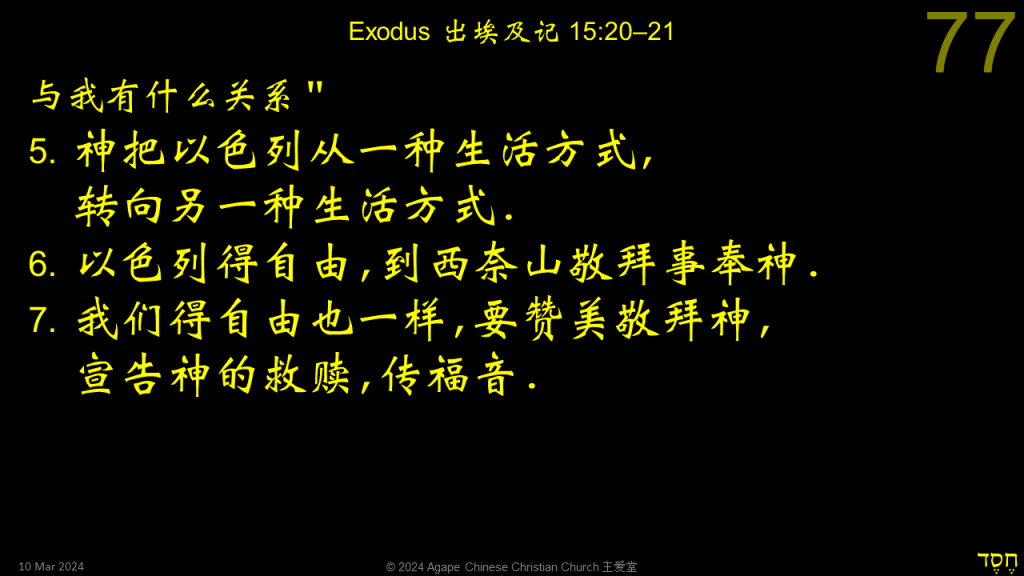米利暗的歌 Song of Miriam
出埃及记 Exo 15:20–21
Remember these points
I put these points at the top of my sermon-prep template to remind myself every week:
- Show that main point of passage relates to Jesus and his saving work
- (1 Cor 1:18) A truly gospel-centred message will not be acceptable in a synagogue or mosque
- Did I proclaim the gospel as the headline news of the sermon, rather than as a “by the way…”?
- Unbelievers are called to repent, believe, and be saved
- Believers are encouraged to abandon their old self, renew their minds, put on the new self in Christ
- Preach simple sermons, so that God’s people can see Christ more clearly and love him more dearly
News
Hook
Subject here
Contents here
Passage
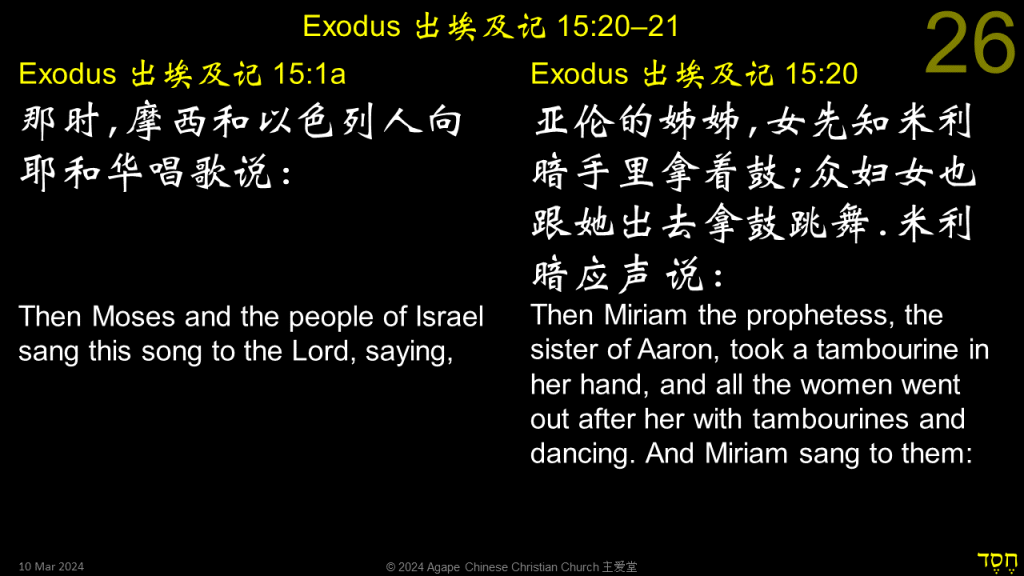
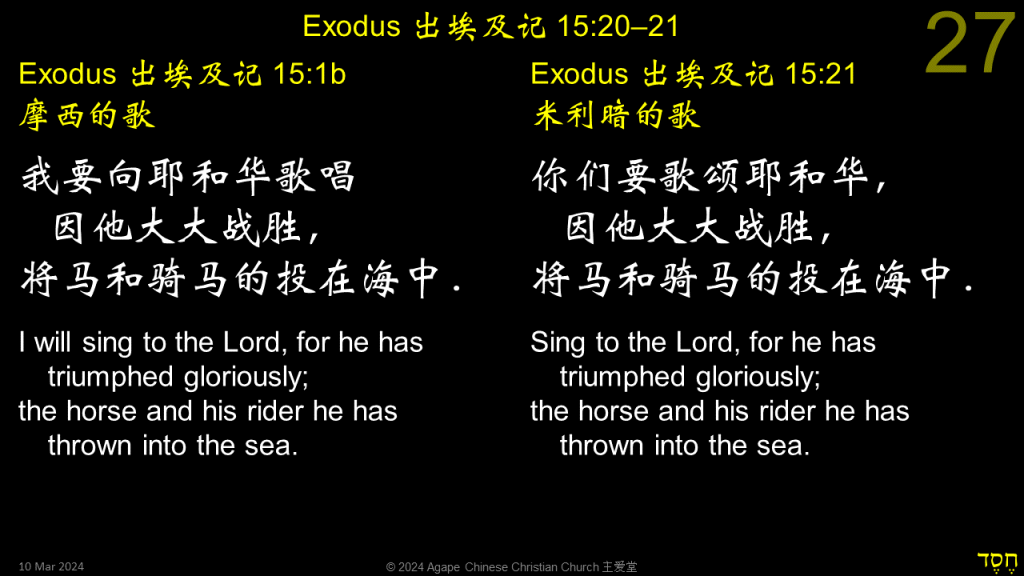
Outline <34>
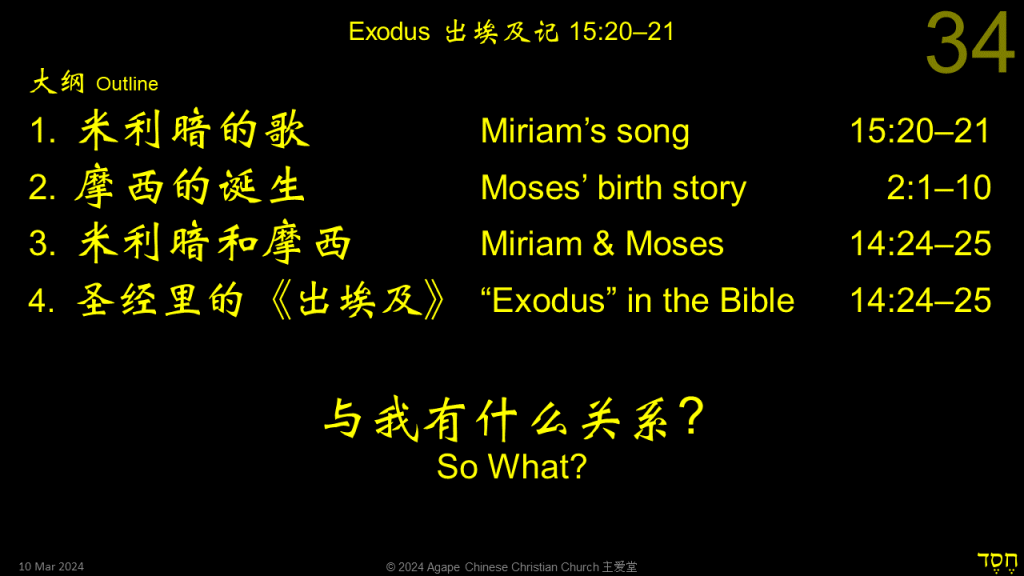
Section 1 米利暗的歌 Miriam’s song
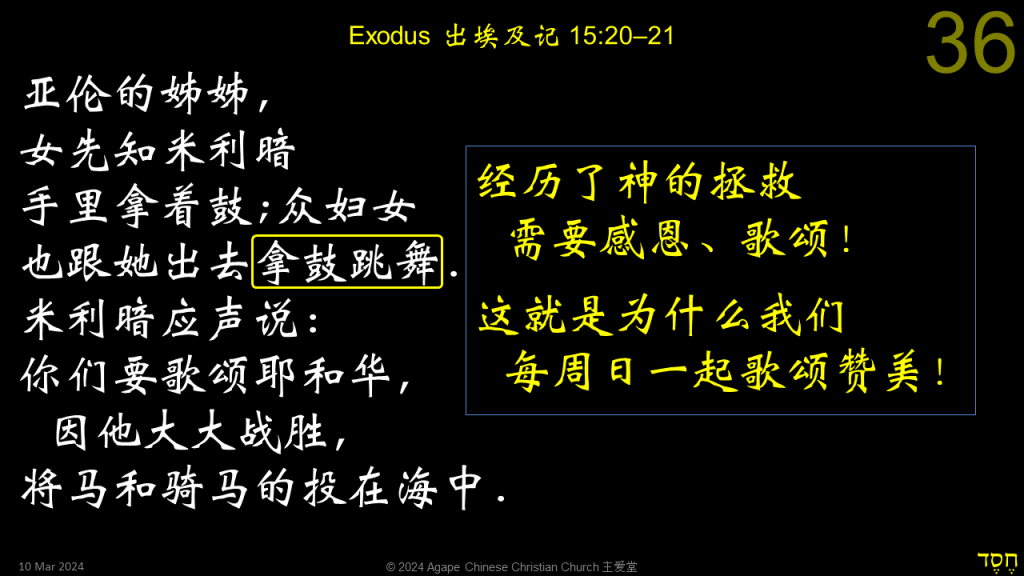
After experiencing God’s salvation, the natural thing to do is to give thanks, sing praises to God!
This is why we sing hymns together every Sunday.
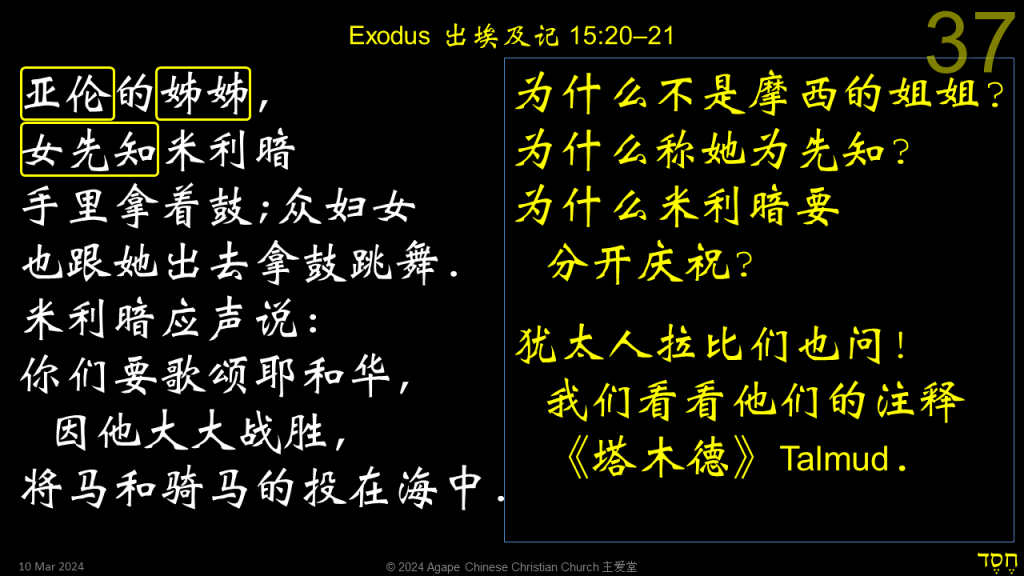
There are some unusual things in Exo 15:20–21.
Why is it Aaron’s sister, and not Moses’ sister?
Moses has been more prominent since about the 5th plague, Aaron was hardly mentioned after that.
Why is she called a prophetess? There’s no record of her sharing God’s word or giving any prophecy.
Why did Miriam had to celebrate separately from the other Israelites? In all other instances of song and celebration in the OT (and NT as well), everyone celebrates together.
Jewish rabbis also asked these questions!
Let’s see how they interpreted these 2 verses.
In the Talmud. Wikipedia articles on the Talmud: in English, in Chinese.
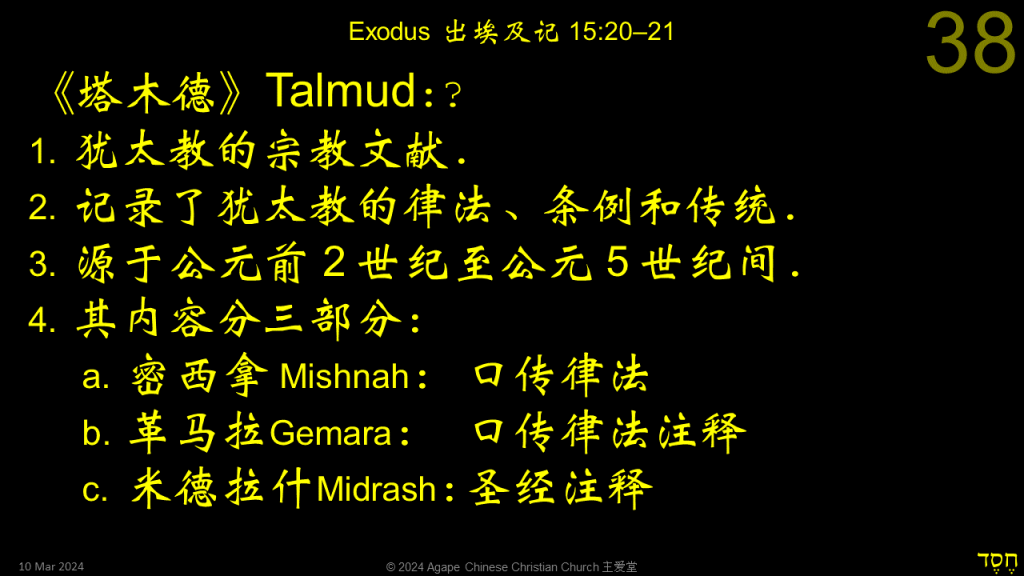
The Talmud:
- Part of Jewish religious text.
- Records all Jewish religious laws, regulations, and traditions.
- Before 200 B.C., it was all orally transmitted. From about 200 B.C. to about A.D. 500, it was in written form.
- Three main sections:
- The Mishnah: Oral transmission of the law
- The Gemara: Oral transmission of interpretation of the law
- The Midrash: Commentary on the Bible (for Jews, the Bible means what we call the OT only, they don’t have the NT).
Section 2 摩西的诞生 Moses’ birth story
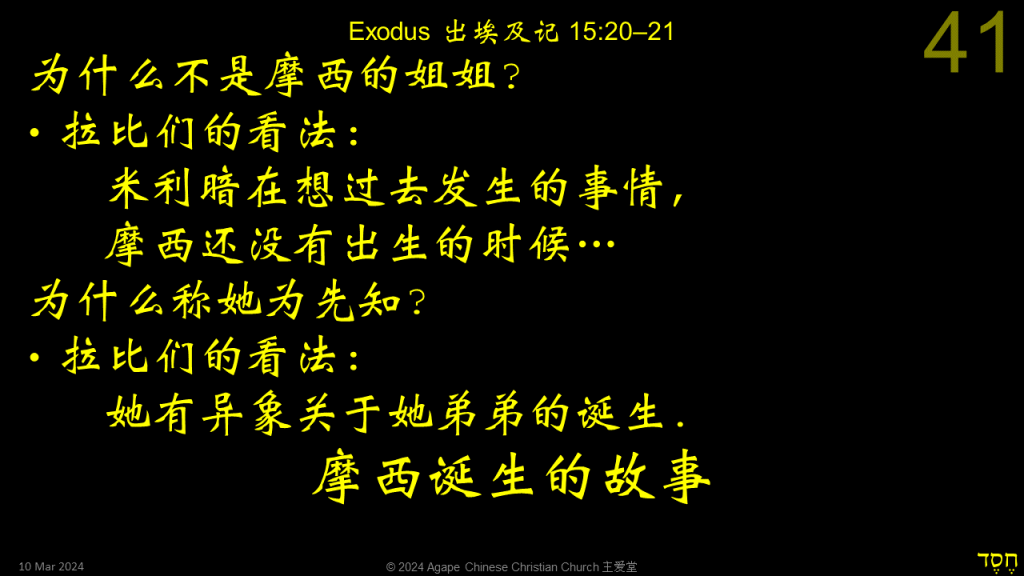
Why not say “Moses’ sister” instead?
The view of the Talmud:
Miriam was thinking about past events, before Moses was even born…
Why call her a prophetess?
The rabbis’ view:
She had a vision about the birth of her brother Moses.
So let’s take a quick look at the birth of Moses.
Birth of Moses is recorded in Exo 2:1–10.
Next two slides show the passage.





Two fonts are used.
First font (more cursive style): Conclusions we can get by making observations from the Bible verses.
Second font (more square style): Conclusions from the Talmud.
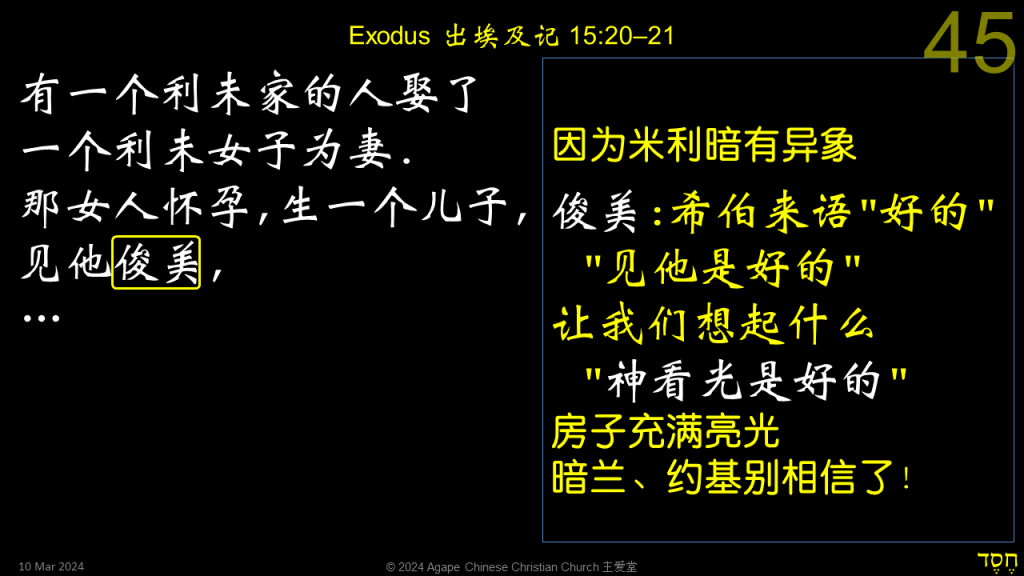
Exo 2:1–2a
The rabbis picked up on the strange wording of the v. 1, and believe that Miriam’s parents (we know them to be Amram and Jochebed (see Exo 6:20) originally decided to separate. Because of Pharaoh’s decree to kill all Hebrew male babies, they decided not to have anymore children, and decided to separate.
But Miriam told them that’s not the right thing to do, because only male child will be killed, and if every couple separates, there won’t be any children born. Also, Miriam told them she had a vision, that her unborn brother will be the deliverer of Israel. So her parents decided to stay together, and Moses was born.
Exo 2:2 says “she saw that he was a fine child.” The Hebrew actually says, “she saw that he was good.” The rabbis picked up on this strange description (what parents evaluate their newborn baby to see is he or she is good).
When did we first hear such an expression? In Gen 1:4, after God created light, and saw that the light was good.
The rabbis believed that when Moses was born, the house was filled with light (good). This is like a confirmation of Miriam’s prophecy that this child is special, so they believed her.
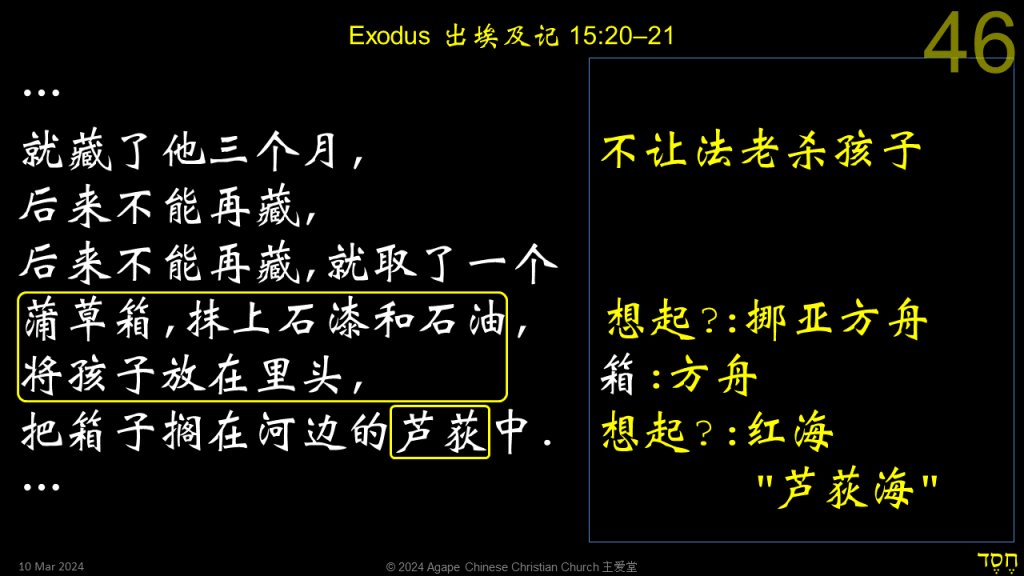
Exo 2:2b–3
To be the deliverer, he at least have to survive Pharaoh’s decree. Jochebed hid him for 3 months, but she can hide him no longer.
Basket, bitumen and pitch: What do these things remind you of? Noah’s ark.
In fact, the Hebrew word translated “basket” here in v.3 is translated “ark” in the flood story. These two stories are the only place in the OT where this word is used.
Among the reeds? It’s a reminder of the Red Sea. In Hebrew, the word is Reed Sea (Red Sea is from a Greek translation of the OT done around 400 B.C.)
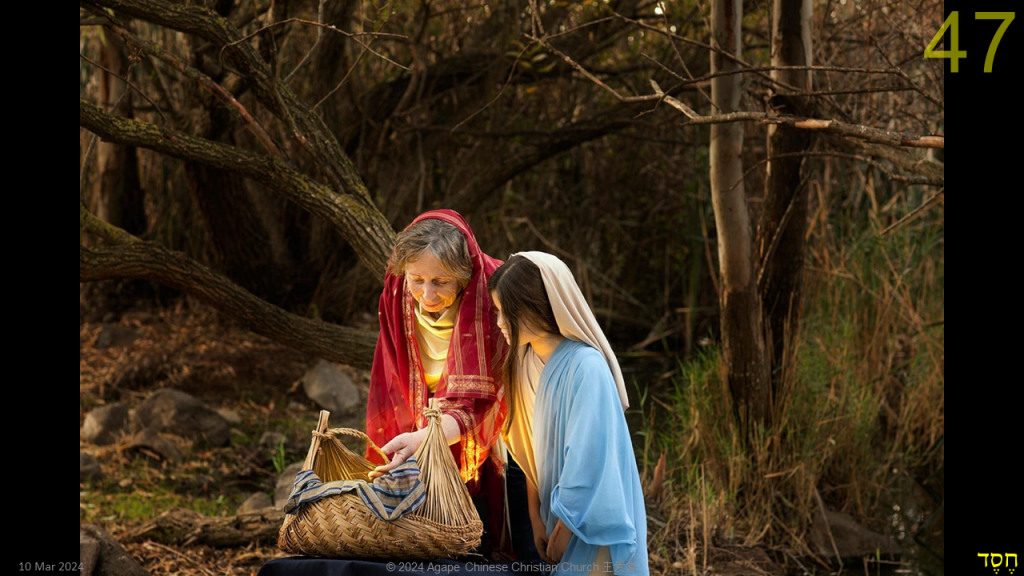
Another picture from Dikla Laor Photography](https://diklalaor.photography/

Exo 2:4–5a
The mother can’t bear to watch what might happen to the baby (he will most likely die), but Miriam didn’t give up. She was watching. We can all imagine what the mother must be feeling.
Pharaoh’s daughter showed up. This is the worse possible scenario.
She is Pharaoh’s daughter, an Egyptian, she would be expected to follow her father’s order and have the baby killed.
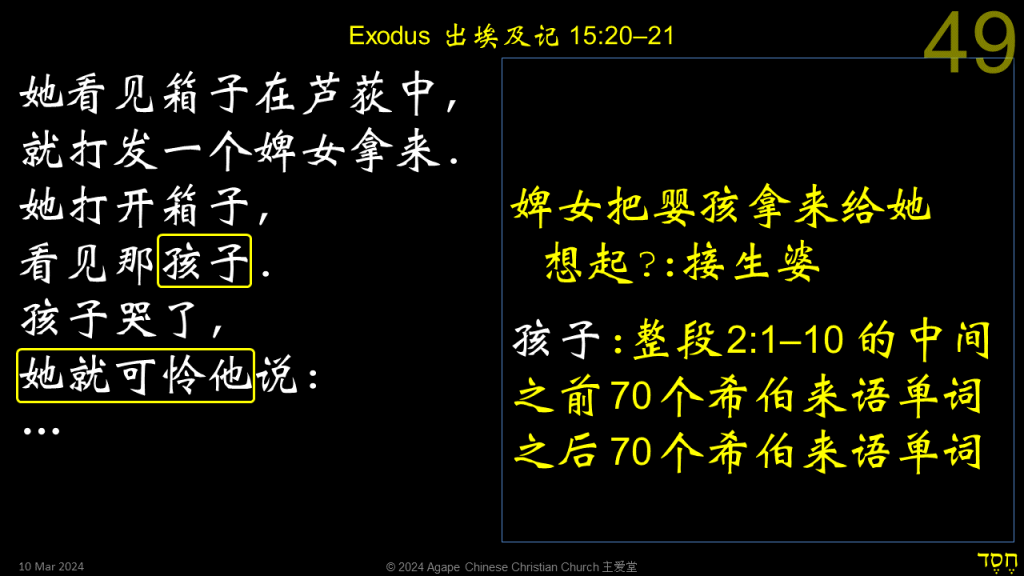
Exo 2:5b–6a
Her attendants brought the baby to her, reminds us of what?
Midwives bringing a newborn to the mother.
So this is written like Moses is the newborn of Pharaoh’s daughter.
In v. 6a, “She saw the child,” “child” is the exact centre of the entire passage (2:1–10). There are 70 words (in Hebrew, of course) before “child,” and exactly 70 words after.
This shows that the key point of the entire passage is “child”.


Exo 2:6b–7
Pharaoh’s daughter was in conflict. She took pity on the helpless baby, but also didn’t want to disobey her father the Pharaoh.
Miriam saw her chance, and right at that moment when then princess couldn’t decide, she stepped up and asked the question.
In NET and ESV, we see two “for you” in the translation. In CUV, it skipped out on one.
The double “for you” makes Miriam’s question sound like Miriam’s suggestion is entirely for the benefit of the primcess.
Miriam bought the princess time, time to decide how a Hebrew baby can be safely brought into the palace.
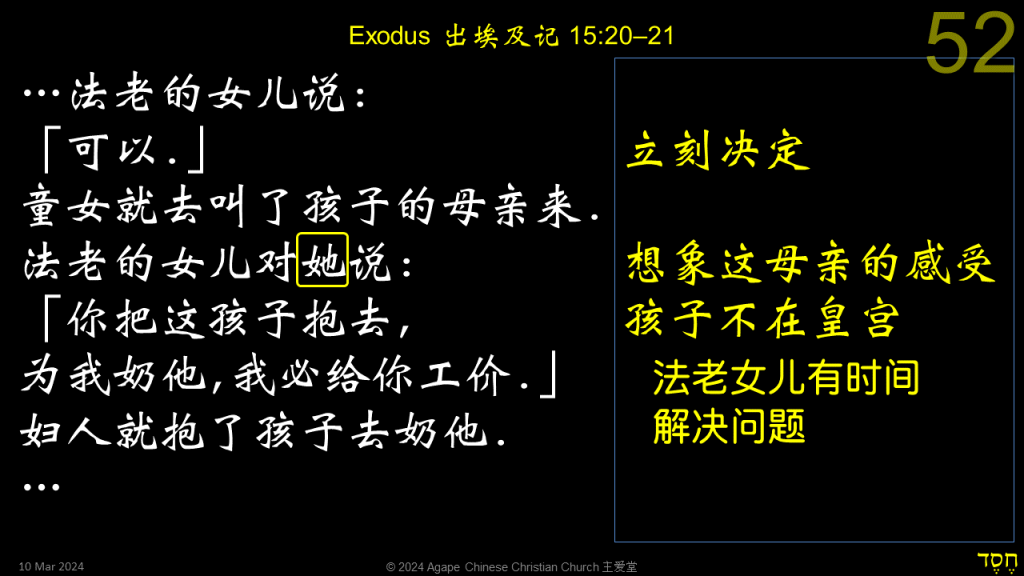
Exo 2:8–9
So the princess decided on the spot, “Yes!”
Who is the pronoun “her” referring to? It’s Moses’ mother.
This means Miriam went back home to tell her mother everything that happened, and brought Jochebed with her to see the princess.
Imagine yourself as Moses’ mother, how would you be feeling when you hear this question from the princess?
The baby is now away from the palace, and the princess has time to set things up to have him come to the palace as her son.
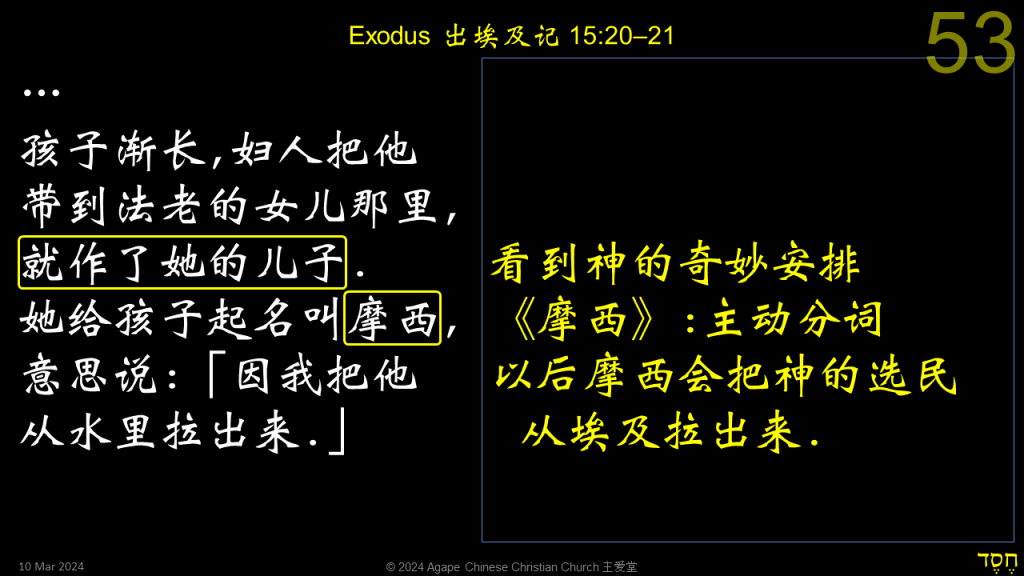
Exo 2:10
Isn’t it amazing how God arranged things?
The baby boy that would have been killed is now taken into the palace as Pharaoh’s daughter’s son.
“Moses” in Hebrew is an active participle, not a passive verb.
The meaning in Hebrew is “the one who draws out.” The princess drew him out of the water, but he will draw the Israelites out of Egypt through the water.
Section 3 米利暗和摩西 Miriam & Moses

Back to the previous slide about the questions on Miriam.

- Why say Aaron’s sister and not Moses’? Because she was thinking back to the time before Moses’ birth.
- Why call her a prophet? Because she had a vision of Moses’ birth.
- Why did she celebrate again after Moses did? Because right at that moment, she saw the deliverance of her people, and that her vision is realised.
Lessons
Section 4 圣经里的《出埃及》 “Exodus” in the Bible
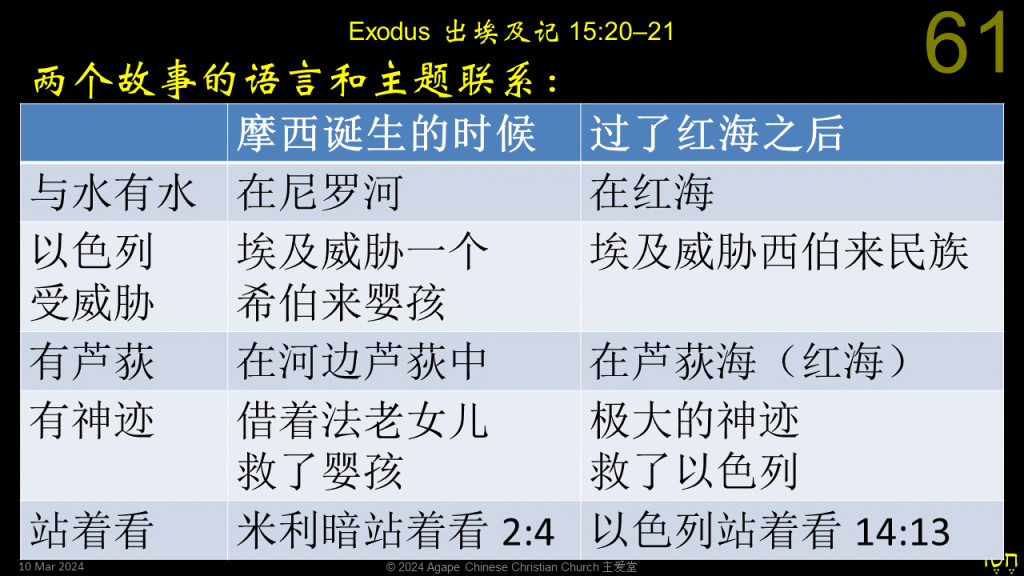
Table shows similarities between Moses’ birth story and the Red Sea crossing story.
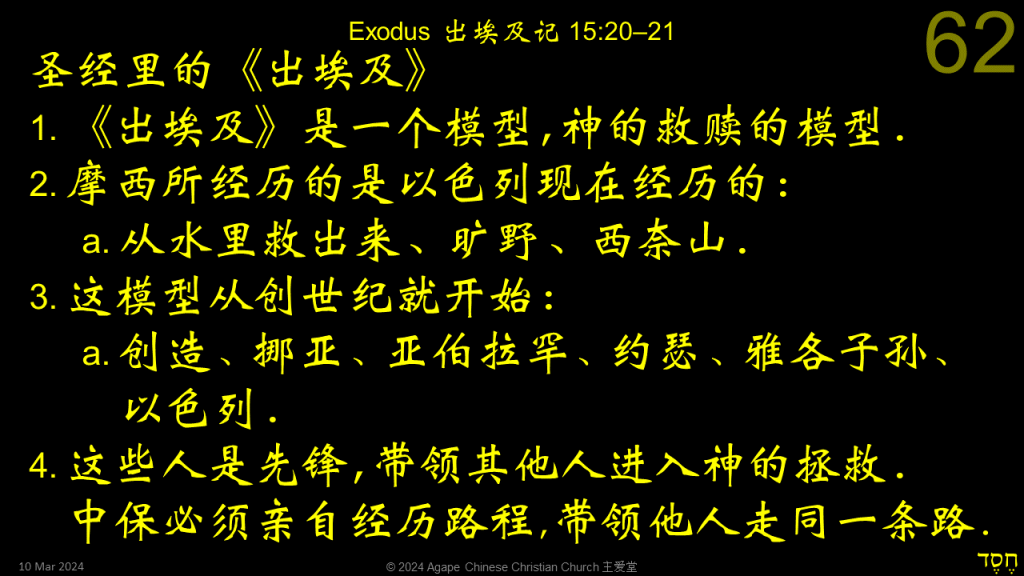
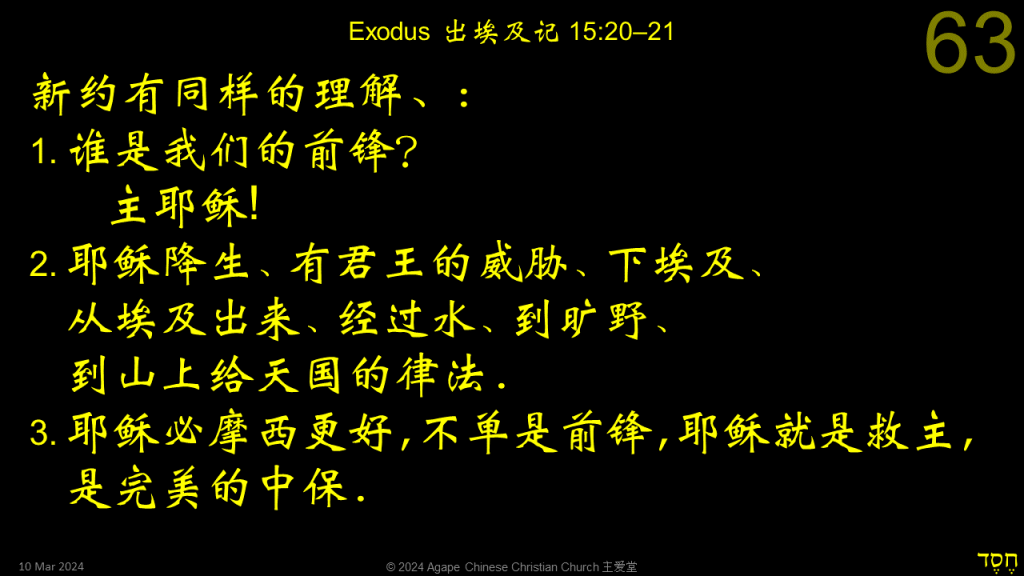
The NT has the same understanding:
- Who is our forerunner? Lord Jesus!
- Jesus’ birth, threatened by a king, down to Egypt, out of Egypt, went through water, into the wilderness, up to the mountain to proclaim the rules of God’s Kingdom.
- Jesus is better than Moses, not just our forerunner, but he himself is the saviour, the perfect mediator.
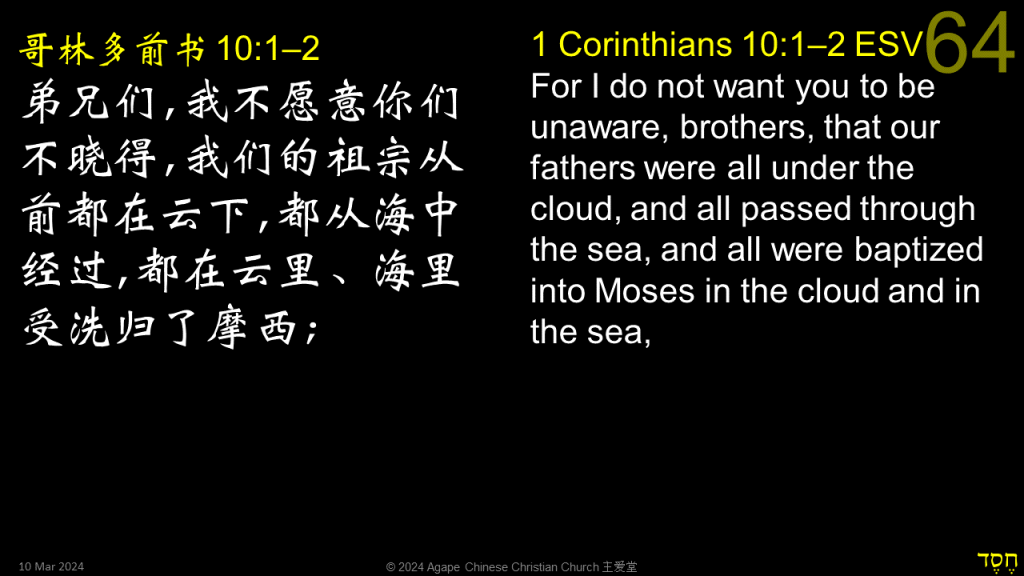
This passage shows Paul had same understanding.
与我有什么关系? So What?
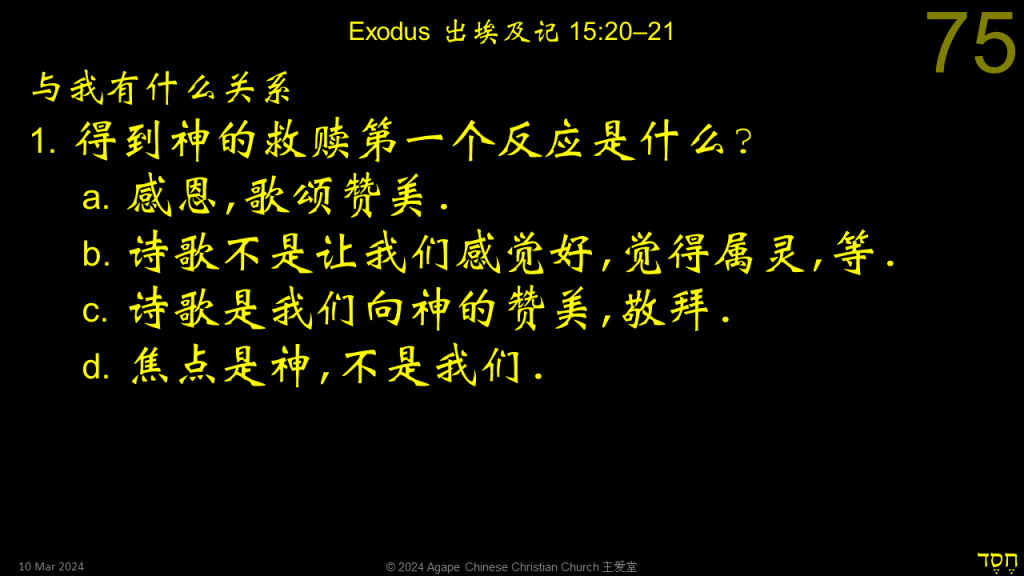
When we received salvation, what’s the first reaction?
- Thanksgiving, praise.
- Hymns are not to make us feel good, or feel spiritual, etc.
- Hymns are our way of praising God, worshiping God.
- The focus is on God, not us.
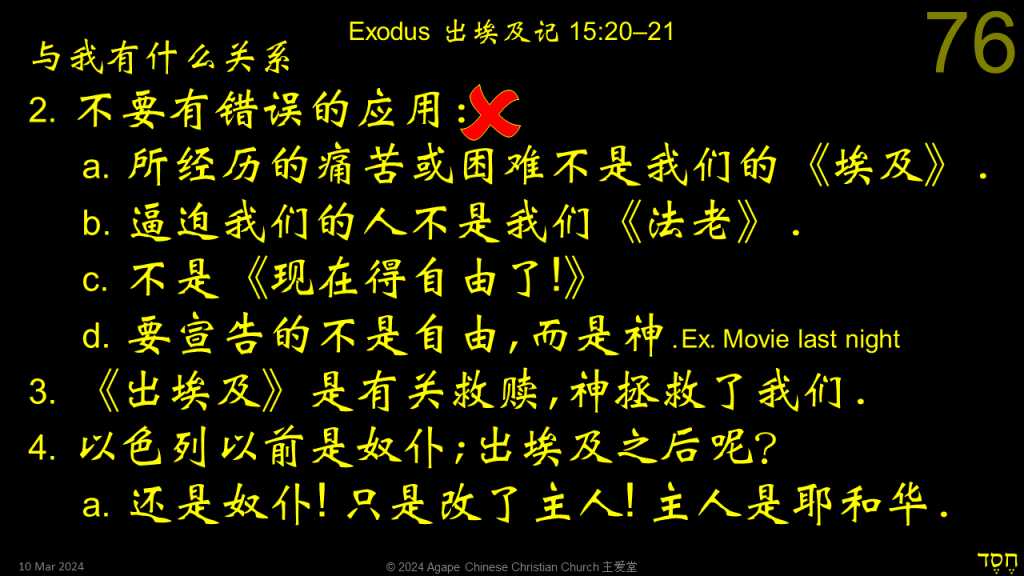
Don’t come up with wrong or inappropriate applications:
- Our pain or troubles are not our “Exodus.”
- People who persecute us are not our “Pharaoh.”
- It’s not that we are now liberated, it’s far more than that.
- We have to proclaim not our freedom, but proclaim God. E.g. of the movie last night. At the very last scene, Moses said “Go, proclaim liberty throughout the land, onto all the inhabitants thereof!” That’s NOT the goal of the Exodus!
- Exodus is about salvation: God saved us.
- Israel was Pharaoh’s slaves, and now after the exodus? They’re still slaves, but just with a new master, YHWH.
